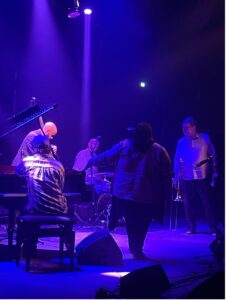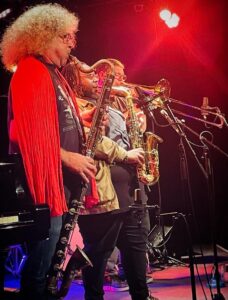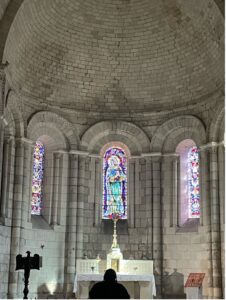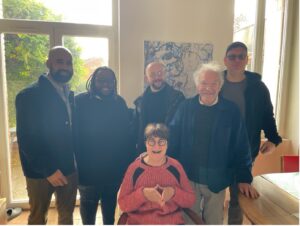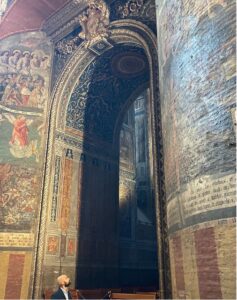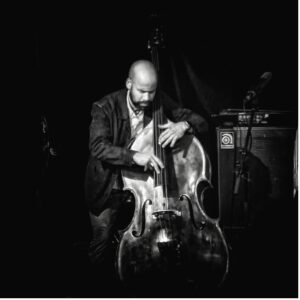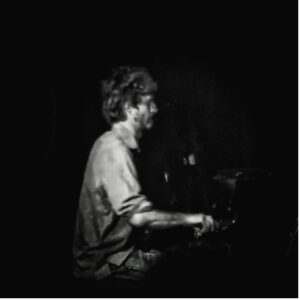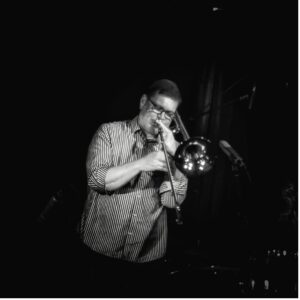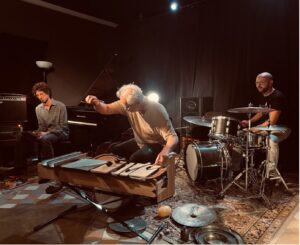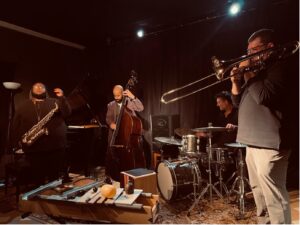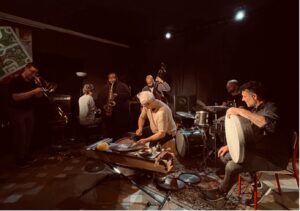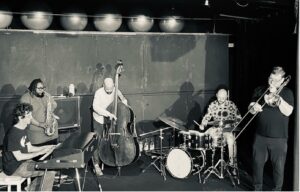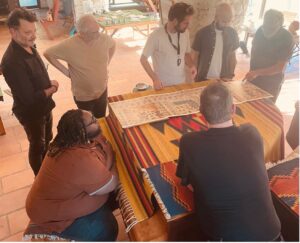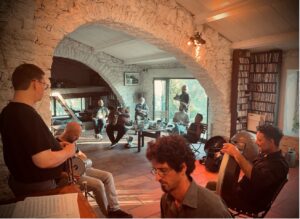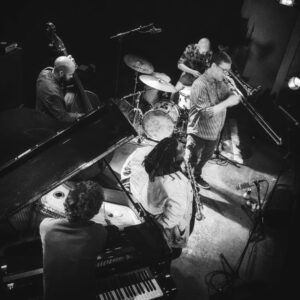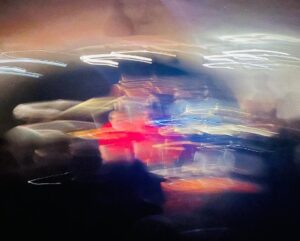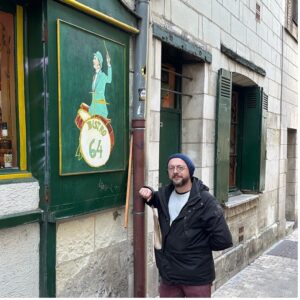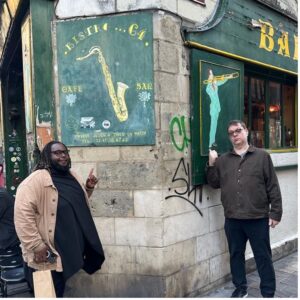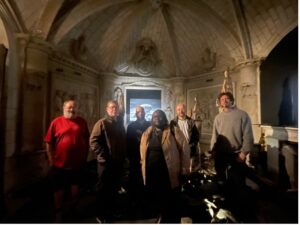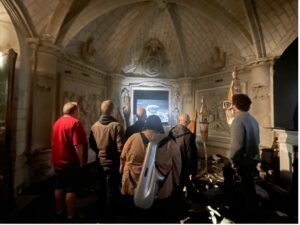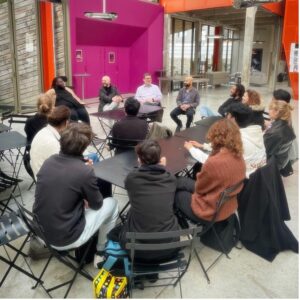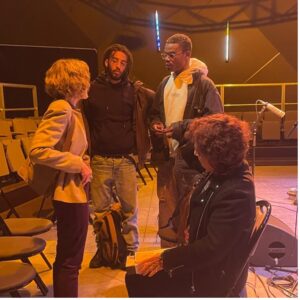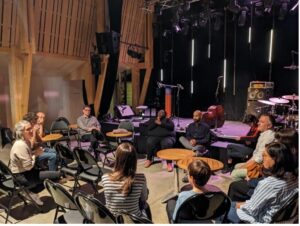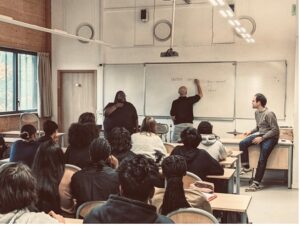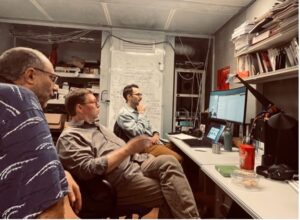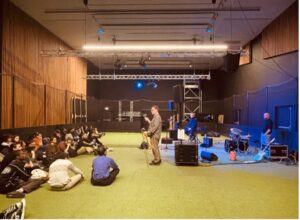Lenard Simpson — alto saxophone
Jeff Albert — trombone
Paul Wacrenier — piano & kalimbas
Christian Dillingham — double bass
Nicolas Pointard — drums
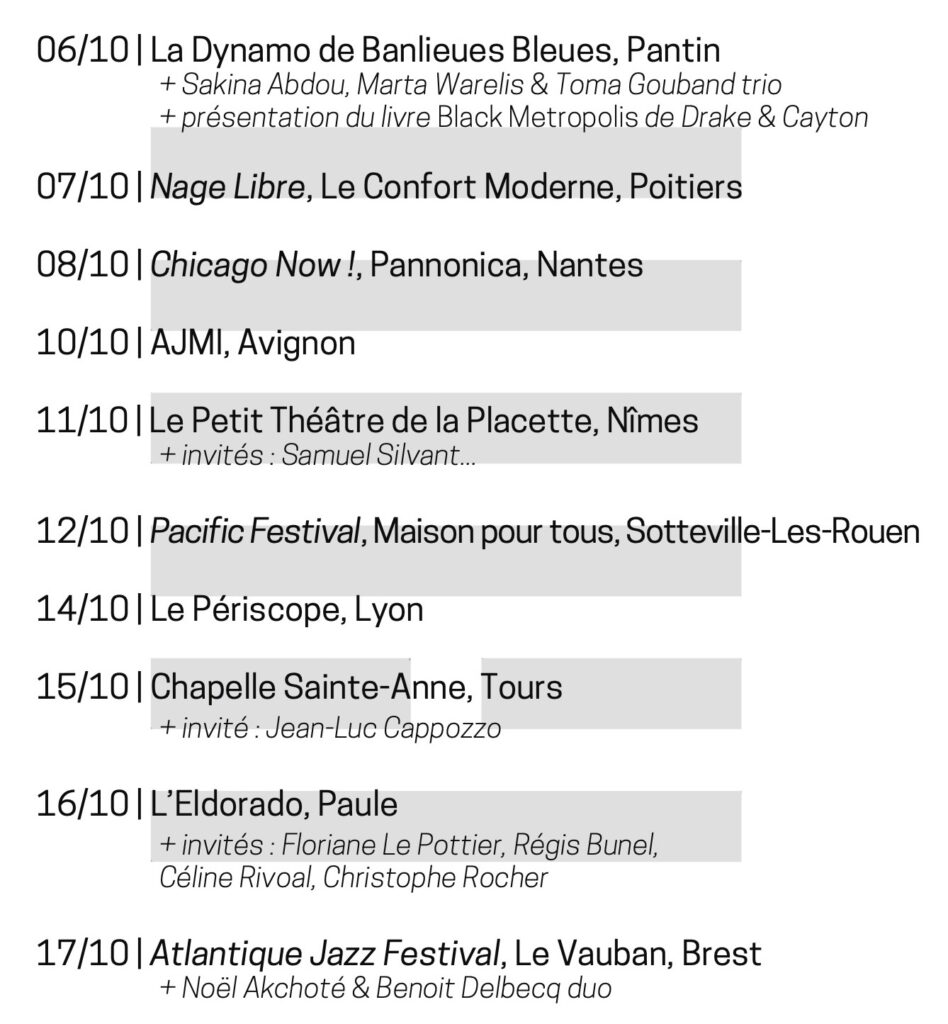
That’s crazy. And it makes perfect sense. When you listen to them you can’t hear yet, the five they already are and soon will be, a new ensemble, a new assembly, to cross The Bridge, they’re pretty clear about their intentions, without having consulted each other more than that, more than necessary. NP the drummer declares: “On paper, it looks like a standard band, or one with standard, even classic instrumentation. What does that tell us? Is it a clue as to what’s going to be played, or what won’t? Or is it a clue to what should be played, or a clue to what can’t be played, or all of the above? The only predictable thing is that there will be play. Playing with sounds, predictions, possibilities and impossibilities.” PW the pianist confirms: “I wanted a ‘classical’ jazz ensemble, to get straight to the point, to allow the instruments to play their traditional role and play a music that has found its point of balance: free jazz. Not to stop there, but rather to seek depth and exploration of the material. The power of “sound and rhythm”. The desire to find a contemporary expression in this music of almost three generations. “Ancient to the Future”, but in a kind of mise en abime of free jazz as an emancipatory and spiritual chant.” And the North Americans, for their part, like JA the trombonist, agree: “One of the great joys of playing improvised music is the new relationships that are built through sound and develop into lasting human connections. Joining a new group of musicians elicits an excitement like children on Christmas morning… Sharing this experience with new audiences, in new places, makes the many many miles travelled in airplanes and trains and buses worth it.” Like CD the double bassist: “I am thoroughly looking forward the explorations to come this October. It is always a pleasure performing with fellow musicians from The Bridge. It is an incredible opportunity to build on current musical relationships, as well as establish new ones as we explore the unknown.” Such as IP lurking in the shadows, with his Saxophone de Jouvence? To explore the unknown? Their “horizon of expectation”, ours, yours: a clear sky, a sky laden with clouds or sand, a stormy sky, a sky of marble or agate. Building relationships through a sound so heavenly and so earthly. Getting to know each other by exploring the unknown.
Sunday, October 5, Paris. First, the pure prismatic joy of the encounter: Lenard Simpson, Jeff Albert, and Nicolas Pointard, arriving early from North America and Armorica, immediately mingled with all or part of Soft Organic Music, the band, most often with two drummers, that Stéphane Payen spins like a carousel on the first Sunday of every month at La Timbale, a new stronghold, a new haunt, a new land of plenty in the 18th arrondissement. Among the constants: Payen on alto saxophone, Sarah Murcia on double bass, and Emilian Ducret on drums. Among the variables: Gilles Coronado on electric guitar and Mike Ladd on spoken word. Among the unknowns that evening were three of the five musicians from Bridge #2.13: Simpson, Albert, and Pointard. It was like being in Balzac’s world. But in the crowded bar-restaurant, it was goblins or St. Elmo’s fire that climbed onto the tables and ceiling lights like the masts of a ship, in the middle of the sea in the middle of the land, magical and mathematical.
Monday, October 6, Pantin. We sometimes have the reflex, the absurd habit of saying that improvised music, when it is “successful,” sounds as if it had been written… But that’s not what happens, at least not at La Dynamo de Banlieues Bleues for the very first concert of The Bridge #2.13 (Simpson on alto saxophone, Albert on trombone, and Pointard on drums, joined by Paul Wacrenier on piano and thumb piano and Christian Dillingham on double bass). The musicians opened up a wide range of silences, moving forward and backward serenely on a checkerboard or chessboard of timbres and coherences, with ribbons of narratives, counter-narratives, and shreds of emotions—specters covered in dark, transparent veils circulating throughout the room. It was carefully improvised, often in full decline, and it was the only way to do it. Sometimes a swarm gathers itself together. The trio of Sakina Abdou, Marta Warelis, and Toma Gouband, who come on next, know something about this.
Tuesday, October 7, Poitiers. Second stop on the exploratory journey at Le Confort Moderne, thanks to the Nage Libre team. Balancing on a tightrope, the five trapeze artists move forward in a chain after practicing the art of the human ladder. The quintet is more often a duo, or a trio, or a quartet, than anything else, and each of their silences is as eloquent as a wild animal. They knead balls of noise and rustling sounds until a large rock rolls down the grassy slope of music in a trail of small pebbles. Lenard’s pebbles, Jeff’s pebbles, Paul’s pebbles…
Wednesday, October 8, Poitiers. Christian Dillingham and Nicolas Pointard (joined by Paul Wacrenier) are invited early in the morning, after a night of full moon, by the improvisers of PIL (PoCo Improvisation Laboratoire) to the Le Local socio-cultural center. After a free warm-up improvisation session lasting about twenty minutes, the participants ask themselves: how can we build a common home in sound? How can we give individuality a roof over its head? Can’t we choose to build a collective house together, just as we can decide to collectively help an individual build their own house… where he or she will invite everyone! And everyone else invites themselves back for a new improvisation, a new land.
Wednesday, October 8, Nantes. Did they realize that the trombone and piano had started alone, only to find themselves alone again thirty minutes later, transformed, with the potomitan of the most extraordinary double bass non-solo, like ice crystals, planted in the middle of time? We did too, by the way. In a sequence that was once again obvious, with restrained and relaxed impulses, hiding places, niches, and secret chambers, The Bridge #2.13 indolently went through mountains and wonders at Pannonica, even receiving a visit in the second set from Sylvain Kassap, who had already been there ten years earlier, almost to the day (October 13, 2015, with The Bridge #9: Transatlantic Amazon Gods, featuring Mike Ladd, Mankwe Ndosi, and Dana Hall). It took persistence and determination for the roots to spread and break through the slab of time. A trident of wind instruments on a piano, a double bass, and a snare drum. Mountains and wonders. A.B. Spellman said that “the new musician has been primarily involved in the cultivation of the Marvelous. And he judges his work more by the frequency with which the Marvelous occurs than by compositional values.”
Thursday, October 9, Albi. Lenard Simpson, Jeff Albert, Christian Dillingham, and Nicolas Pointard are staying with Roland Ossart and Claire Foltete, close friends of Le Frigo (while Paul Wacrenier is at Le Petit Faucheux in Tours with the Healing Orchestra). On the menu for this exploratory tour: veal sauté, a visit to Sainte-Cécile Cathedral (patron saint of musicians), artwork created from snail trails, a demonstration of lenga d’òc, flower-covered skulls…
Friday, October 10, Avignon. Beneath the imposing Palais des Papes, at the AJMi, The Bridge #2.13 reunited once again as a quintet of chameleons. The five musicians dream their music as they play it. Some whistle and meander, others snort in a regained silence. When they find the piano in the depths, the others remain with it, they do not wake it up. Beneath the Palais des Papes, too, there are rows of underground chambers, with medallions and damask fabrics, magical slumbers.
Saturday, October 11, Nîmes. On the way to the Petit Théâtre de la Placette, we saw a magpie flying under the moon in broad daylight. That, plus the card games and smoke curling from Le Rugby bar, founded by the late Michou, the “star of the neighborhood,” are good omens. Towards the impossible, as the locals say. So today we’re mixing things up. First, the trio of Paul Wacrenier (amplified thumb piano) and Nicolas Pointard (drums on dotted notes) with Jean-Pierre Jullian (percussion in the flesh and in fallow) creaks blades and jaws, then gallops away. Next, the quartet of Jeff Albert (trombone), Lenard Simpson (alto saxophone), and Christian Dillingham (double bass) with Samuel Silvant (sulfurous drums) reconstructs a melodic scene. Finally, it’s Byzantium: a cascade of ice for a seven-piece tutti, a slippery and fickle tutti.
Sunday, October 12, Sotteville-lès-Rouen. By train (which allows us to compare the merits of Thelonious Monk and Hasaan Ibn Ali, or avoid a fine for disproportionate double bass, because the conductor loves music and stops her inspectors from fining us), to everything that follows and is well named, still auspicious in a rough world: at the Maison pour Tous, as part of Home Factory, for the fifth edition of the Pacific Festival. The Bridge #2.13 evolves in a tight formation and relaxed rhythm, or is it the other way around? In a relaxed formation and tight rhythm. In any case, they have become aware of this and agree (and live by) the fact that, over the course of an hour, it is rare to hear the entire quintet. Each member constantly steps aside to let the genius shine through, whether from the lamp or the music.
Tuesday, October 14, Lyon. Through the Periscope’s lens, we watch the reunion between Lenard Simpson, Jeff Albert, Paul Wacrenier, Christian Dillingham, and Nicolas Pointard. It started like a boxing match, with knives drawn and no holds barred. Then, stunned, the pugilist musicians began a long and magnificent free fall into the void, decidedly free, toward the microscopic, which ended or was accomplished in a heart-rending cry. Two encores, one elephantine, the other like a bridge between Lyon, Chicago, and New Orleans this time.
Wednesday, October 15, Tours. In the cellar of the Chapelle Saint-Anne, the quintet-that-is-never-really-a-quintet welcomes a new guest. With The Bridge #2.13, Jean-Luc Cappozzo is devilishly chthonic that evening. Between the nave and the humus, the six musicians push back the walls with sedimentary explorations and solos as the crow flies.
Thursday, October 16, Paule. It is in Kreiz Breizh, at the Eldorado in Paule, that the gold diggers land. And thanks also to the explorers of the Nautilis ensemble and the Musiques Têtues company. First, the five of them laid the foundations of the edifice that the group has been building stone by stone for more than ten days now. Then, joined by Christophe Rocher, Céline Rivoal, Floriane le Pottier, and Régis Bunel, it was time for the big round, the big thunder.
Friday, October 17, Brest. Last lap for those who have now taken the name “Glass Lights” at Le Vauban, in Brest, on the steps of the Atlantic. A final journey into matter, into the roughness of broken glass and the graininess of a caress. This is not a farewell, but the end of a passage and the promise of a return. Too many questions remain unanswered.
And then there were all the encounters on the sidelines. Full margins. Full hearts. With the students of Paris 8 University – Saint-Denis, with Danièle Joly and Anne Raulin, co-editors of the very first French version of Black Metropolis, the masterpiece of urban sociology on Chicago, written by Horace R. Cayton and St. Clair Drake, with students from the Conservatoire de Poitiers and the Lycée Gustave Eiffel in Gagny, at IRCAM with Jeff Albert to work on the Somax2 program created by Gérard Assayag and developed by Marco Fiorini, at the MJC – Les Hauts de Belleville with students from Paris 8 University and those from the Jazz and Improvised Music Department of the Conservatoire National Supérieur de Musique et de Danse de Paris (CNSMDP), in Lyon with students from the CFMI and ENM, and in Guipavas with students from the Collège du Vizac.


